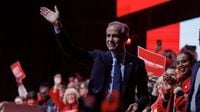In a historic election that has captured the attention of Canadians and the world alike, Prime Minister Mark Carney's Liberal Party is set to form the next federal government, securing a rare fourth consecutive term. The election results, projected on April 29, 2025, show the Liberals leading in 167 ridings compared to the Conservatives’ 145, the Bloc Québécois’ 23, the NDP’s 7, and the Green Party’s 1. However, whether the Liberals will govern as a minority or majority government remains uncertain, as a majority requires 172 seats.
Carney addressed a jubilant crowd in Ottawa, emphasizing unity, humility, and ambition as guiding principles for his government. He warned of tough times ahead due to a looming trade war with the United States, particularly under the leadership of President Donald Trump, whom he accused of threatening Canada’s sovereignty. “I have been warned, America wants our land, our resources, our water, our country. These are not idle threats. President Trump is trying to break us so that America can own us. That will never, ever happen,” Carney declared.
In his first address following the projected election results, Carney called for an end to division among Canadians, stating, “As we come here after this most consequential election, let's put an end to the division and anger of the past. We are all Canadian, and my government will work for and with everyone.” He particularly reached out to those in Conservative-leaning provinces like Saskatchewan and Alberta, while expressing appreciation for Quebec culture.
Carney’s speech resonated with a crowd eager for a new direction. He channeled a phrase reminiscent of Trump’s rhetoric, saying, “It is a time to be bold, to meet this crisis with overwhelming positive force of a united Canada, because we are going to build, baby, build.” This slogan encapsulated Carney’s vision for Canada, which he described as being at a “hinge moment,” akin to the end of the Second World War or the Cold War.
Reflecting on the changing dynamics of Canada’s relationship with the United States, Carney noted, “We are over the shock of the American betrayal, but we should never forget the lessons that we have to look out for ourselves.” He emphasized that when he meets with Trump, it will be to discuss the economic and security relationship between two sovereign nations, underscoring that Canada has many options for building prosperity beyond the U.S.
As the election unfolded, the political landscape shifted dramatically. Just four months prior, the Liberals appeared poised for a devastating loss, with polls suggesting a 20-point lead for the Conservatives. However, the resignation of former Prime Minister Justin Trudeau and the subsequent rise of Carney revitalized Liberal support, particularly in the face of Trump’s aggressive stance toward Canada.
The trade war with the U.S. has been a pivotal issue in the campaign. Trump’s threats to impose tariffs on Canadian goods have ignited fears about the economic implications for a country that sends over 75% of its exports to the United States. Carney’s response has been to advocate for building homes, trade and energy corridors, and developing careers in skilled trades, positioning Canada as an energy superpower in both clean and conventional energy.
Meanwhile, Pierre Poilievre, the Conservative leader, conceded victory to Carney but vowed to continue leading his party. Poilievre congratulated Carney for his win, acknowledging the challenges ahead. Despite trailing in his own riding of Carleton, where he is at risk of losing his seat, he stated, “To my fellow Conservatives, we have much to celebrate tonight. We’ve gained well over 20 seats. We got the highest share of the vote our party has received since 1988.”
In a surprising turn of events, Jagmeet Singh announced his resignation as leader of the New Democratic Party after a disappointing election night, where the NDP secured only 6% of the vote and led in just eight ridings. Singh expressed disappointment but remained hopeful for the future of the party.
Adding to the drama, Conservative MP Jamil Jivani criticized Ontario Premier Doug Ford during a party gathering, stating, “I see Doug Ford as a problem for Ontario and for Canada. I think he’s not doing a great job in running this province.” His comments were met with enthusiasm from party supporters.
The election was also marked by a tragic incident in Vancouver, where a car ramming attack left 11 people dead. This tragedy cast a shadow over the electoral process, prompting moments of silence and reflection as Canadians went to the polls.
As the dust settles from the election, the question remains: what will a Carney-led government mean for Canada? With the Liberals projected to fall short of a majority, negotiations with opposition parties will be crucial. The Bloc Québécois, projected to win about 23 seats, may hold the balance of power, while the NDP's future in Parliament hangs in the balance.
In the coming weeks, Carney will face the monumental task of addressing the challenges posed by the U.S. trade war, the cost-of-living crisis, and the need for national unity. His message of ambition and humility will be tested as he seeks to govern for all Canadians, regardless of their political affiliations.
As the election results are finalized and the new government takes shape, Canadians will be watching closely to see how Carney navigates the complexities of international relations, domestic policy, and the expectations of a diverse electorate.





